How to Stay Motivated on Keto: Frequently Asked Questions
Curious about the Keto diet and how it can elevate your ketogenic lifestyle?
This comprehensive guide offers everything you need to know, from the foundational principles of the keto diet to its impressive weight loss benefits and nutrient management.
You ll uncover valuable tips for maintaining motivation, overcoming obstacles, managing carb intake, and debunking common myths.
Additionally, you ll find a collection of delectable Keto-friendly recipes, sample menus, and essential tools like a keto calculator to track your progress and adjust your macros.
Whether you re just embarking on this journey or seeking to enhance your experience, this guide is designed to keep you inspired and well-informed.
Contents
- Key Takeaways:
- What is the Keto Diet?
- How Does the Keto Diet Help with Weight Loss?
- How to Stay Motivated on the Keto Diet?
- What You Need to Know About the Keto Diet
- Are There Any Risks Associated with the Keto Diet?
- What Are Some Delicious Keto-friendly Recipes?
- How Can I Track My Progress on the Keto Diet?
- How Can I Track My Progress on the Keto Diet?
- What Are Some Useful Tools for Tracking My Macros and Progress?
- How Often Should I Weigh Myself on the Keto Diet?
- Frequently Asked Questions
- How can I stay motivated on Keto when I’m feeling discouraged?
- Can I have cheat days while on Keto?
- What are some tips for staying motivated during social events or holidays?
- How can I combat cravings for non-Keto foods?
- What should I do if I hit a weight loss plateau on Keto?
- How can I stay motivated to cook and meal prep while on Keto?
Key Takeaways:

- Staying motivated on the Keto diet is essential for success, especially during phases like keto flu.
- Overcome plateaus and challenges by trying new recipes and tracking progress.
- Keep yourself motivated by setting realistic goals and finding a support system.
What is the Keto Diet?
The Keto Diet, or ketogenic diet, is an elevated eating plan that emphasizes high fat and low carbohydrate intake, expertly crafted to transition your body into a metabolic state known as ketosis by reducing carbs and increasing dietary fat.
In this state, your body shifts its energy source from carbohydrates to fats, transforming the way it fuels itself. By significantly reducing your carbohydrate consumption and increasing your fat intake, you can align with a range of health objectives, including effective weight loss, enhanced mental clarity, and more stable blood sugar levels.
What Are the Basic Principles of the Keto Diet?
The fundamental principles of the ketogenic diet hinge on significantly reducing carbohydrate intake while simultaneously elevating dietary fat levels. This approach enables your body to enter a state of nutritional ketosis, where fat becomes the primary source of energy.
Achieving this intricate balance requires thoughtful consideration of macronutrient ratios. Typically, you’ll aim for a daily intake that consists of about 70-75% fats, 20-25% protein, and a mere 5-10% carbohydrates. A diverse array of healthy fat sources will aid you in this endeavor, including olive oil, avocado, and MCT (medium-chain triglyceride) oil, which provides quick energy without causing spikes in blood sugar levels. Monitoring ketone levels can also help track your progress toward nutritional ketosis.
Incorporating sufficient protein is essential for maintaining muscle mass while minimizing the risk of muscle loss during weight loss, further emphasizing the diet’s role in promoting overall health. This strategic balance not only cultivates an effective fat-burning metabolism but also enhances satiety and suppresses cravings, making it more manageable for you to adhere to the diet in the long run. For athletes, maintaining proper protein intake is particularly crucial.
How Does the Keto Diet Help with Weight Loss?
The ketogenic diet offers a powerful approach to weight loss by significantly reducing caloric intake through the enjoyment of high-fat, low-carb foods that promote nutritional ketosis. This process encourages your body to tap into stored fat for energy and manage blood lipid levels.
As you transition into ketosis, your body shifts its primary energy source from carbohydrates to fats, which leads to enhanced fat oxidation. This metabolic state not only accelerates fat burning but also plays a vital role in appetite suppression, making it easier for you to avoid overeating and achieve rapid weight loss.
Incorporating healthy fats think avocados, nuts, and olive oil plays a crucial role in creating a sense of fullness and satisfaction, allowing you to manage your caloric intake with greater ease. Striking a balance in nutrient intake while adhering to this low-carb framework highlights the significance of both the types of food you consume and their quantities, ensuring a path to sustainable weight loss.
How to Stay Motivated on the Keto Diet?
Remaining motivated on the keto diet can prove to be a daunting task, especially during the initial transition phase often referred to as the keto flu. This phase may bring about feelings of fatigue and cravings for carbohydrates. Managing your ketone levels can provide reassurance that you’re on the right path.
However, keeping in mind the long-term health benefits can serve as a powerful anchor, helping you stay focused on your weight loss goals and embrace a ketogenic lifestyle. Incorporating strategies like fat fasting can help overcome short-term challenges and maintain motivation.
Top Tips to Keep You Motivated on the Keto Diet
To keep your motivation soaring on the keto diet, think about meal prepping with a range of delicious keto-friendly recipes and setting clear goals. Regularly tracking your progress will help you celebrate those important milestones along the way.
In addition to these strategies, don t shy away from experimenting with new keto recipes. This can truly revitalize your meal routine, injecting excitement and culinary creativity into your journey. Engaging with a supportive community whether online or in person will provide you with the encouragement you need, shared experiences, and fresh ideas for sticking to your dietary plan and managing nutrient intake.
Utilizing a keto calculator is another powerful tool at your disposal, allowing you to fine-tune your macronutrient goals according to your specific needs. Understanding how net carbs work helps you manage your intake more effectively.
Ultimately, maintaining a positive and flexible mindset is essential. It gives you the power to adapt and navigate challenges without feeling discouraged, fostering long-term adherence to your dietary choices. Whether you’re following a dairy-free keto or vegetarian keto approach, flexibility is key.
How Can I Overcome Plateaus on the Keto Diet?

Overcoming plateaus on the keto diet often requires you to reassess your carb management and fat intake. It might be time to adjust your net carbs to reignite the fat-burning process and break through that weight loss stagnation.
Recognizing that changes in your caloric intake or macronutrient ratios can contribute to this standstill is crucial for making progress. You may unknowingly be increasing your caloric consumption or neglecting to adjust your macros, which can lead to diminished fat loss and affect your ketone levels.
To tackle these challenges, consider strategically modifying your carbohydrate intake perhaps through cycling or by reassessing the quality of the carbs you consume. Incorporating intermittent fasting a method where you cycle between eating and fasting periods can also enhance your metabolic flexibility, allowing your body to access stored fat more efficiently.
Additionally, taking a fresh look at your exercise routines can be beneficial. Increasing intensity or trying new forms of movement can reignite fat loss and finally put an end to those frustrating plateaus.
What You Need to Know About the Keto Diet
What Are Some Common Challenges on the Keto Diet and How to Overcome Them?
You may encounter common challenges while on the keto diet. These include experiencing keto flu symptoms, managing potential health risks, dealing with constipation, and addressing unexpected weight gain.
Fortunately, these hurdles can often be overcome by implementing supportive strategies. Consulting a keto FAQ or knowledge base for common questions and solutions can be very helpful.
Hydration is essential for alleviating keto flu symptoms. Keeping your fluid levels adequate can help reduce fatigue and enhance your overall sense of well-being.
Incorporating fiber-rich low-carb foods into your daily meals is another smart move to combat constipation. This ensures that your digestion remains regular without straying from your dietary goals.
Unexpected weight fluctuations may take you by surprise. This highlights the importance of regularly monitoring your weight and making necessary adjustments.
By staying informed about the inherent challenges of this lifestyle, you can embrace flexibility and adaptation. Cultivating a sustainable approach that aligns with your unique health objectives and personal preferences is key.
What Are Some Common Misconceptions About the Keto Diet?
Several misconceptions about the keto diet linger. One such belief is that a high-fat intake automatically increases health risks.
In reality, a well-formulated ketogenic diet can enhance heart health. It improves HDL cholesterol, LDL cholesterol, and triglyceride levels, and aids in weight management by emphasizing healthy fats.
Pay attention to the types of fats you consume. Choosing sources like avocados, nuts, and olive oil can provide beneficial effects.
This choice counters the widespread notion that all fats are detrimental and reduces the risk of heart attacks associated with unhealthy fats.
Many people mistakenly associate the keto diet with nutritional deficiencies. They worry that cutting out certain food groups will lead to a lack of vital vitamins and minerals.
However, by thoughtfully incorporating a variety of low-carb vegetables and quality protein sources, you can create a nutritionally balanced approach.
This supports overall health while enjoying the benefits of ketosis. Ensuring adequate protein intake is also crucial for avoiding deficiencies.
Embracing a holistic and informed perspective on the ketogenic lifestyle will dispel fears and facilitate a smooth, successful transition.
Is the Keto Diet Safe for Everyone?
While the keto diet can be a powerful tool for weight loss and health enhancement, it may not be safe for everyone.
Those with pre-existing health conditions should consult healthcare professionals before embarking on this dietary journey.
Athletes or those with specific dietary needs, such as a dairy-free or vegetarian keto diet, may require customized strategies.
The ketogenic lifestyle requires significantly reducing your carbohydrate intake while increasing fats.
This can profoundly transform your body s metabolism. However, for specific groups like individuals with kidney disease, liver issues, or diabetes the potential risks could overshadow the benefits.
It s important to understand that not every body reacts the same way to dietary adjustments. Therefore, customized strategies are essential.
Moderate alcohol consumption is also something to consider, as alcohol on keto can affect your blood sugar levels.
Healthcare providers can offer you personalized guidelines tailored to your unique health profile and any contraindications.
This ensures you embrace the keto diet in a balanced and effective manner.
With the right knowledge and approach, you can thrive on the keto diet and achieve your health goals!
Are There Any Risks Associated with the Keto Diet?
Are There Any Risks Associated with the Keto Diet?
The risks associated with the keto diet may include potential nutritional deficiencies and alterations in blood lipid levels. You ll need to carefully manage your food choices to maintain your health while embracing this high-fat lifestyle.
As you embark on this dietary journey, it’s important to keep a close eye on your blood sugar levels. This is particularly crucial during the initial transition phase when your body shifts from burning carbohydrates to fats for energy. This adjustment can lead to fluctuating insulin responses, creating challenges, especially if you have pre-existing conditions like diabetes.
To mitigate these health risks, thorough planning is crucial. Incorporate a variety of healthy whole foods into your meals to prevent deficiencies in essential vitamins and minerals. Consulting with healthcare professionals can provide you with tailored advice, ensuring that your blood lipid levels are regularly monitored and that any necessary adjustments to your diet are made promptly.
What Are Some Delicious Keto-friendly Recipes?
What Are Some Delicious Keto-friendly Recipes?
You ll find an abundance of delicious keto-friendly recipes at your fingertips, enabling you to savor a diverse array of meals that align perfectly with ketogenic diet principles.
By incorporating healthy fats and low-carb ingredients, you can transform meal prep into a truly enjoyable and satisfying experience.
What Are Some Easy Keto Snack Ideas?

Regarding easy keto snack ideas, think low-carb and high in healthy fats. Options like cheese sticks, nuts, and avocado are perfect for curbing cravings while keeping you firmly within the ketogenic diet.
In addition to these staples, consider incorporating hard-boiled eggs or beef jerky into your snack rotation. Both options offer a hearty dose of protein along with those essential healthy fats. When selecting nuts, it s wise to choose varieties such as macadamias or pecans, as they tend to be lower in carbs compared to others.
Remember, portion control is key; measuring out your snacks can help prevent overeating while ensuring you maintain a balanced intake of macronutrients. If you’re often on the go, preparing snack packs of these items in advance and storing them in convenient containers can make it much easier to stay on track with your keto journey, no matter how busy life gets.
What Are Some Keto-friendly Options for Eating Out?
When dining out, you might find that discovering keto-friendly options is easier than you anticipated. Many restaurants now proudly feature dishes that cater to low-carb lifestyles, allowing you to manage your carbs with ease and pleasure without sacrificing flavor.
To truly elevate your dining experience, consider exploring a variety of cuisines that naturally embrace low-carb ingredients. For instance, at Italian restaurants, why not opt for grilled meats or seafood, paired with a side of saut ed vegetables instead of that tempting pasta?
Asian cuisine can be a treasure trove for keto enthusiasts, offering a plethora of stir-fried dishes brimming with vegetables and protein. And don t hesitate to customize your meal! Asking for sauces on the side or swapping out carb-heavy sides for leafy greens can seamlessly align your dish with keto guidelines.
With just a few simple modifications, you can transform a standard menu item into a delightful keto-friendly feast.
How Can I Track My Progress on the Keto Diet?
How Can I Track My Progress on the Keto Diet?
Monitoring your progress is vital to achieving your goals! Tracking your progress on the keto diet is crucial for grasping how your body reacts to dietary changes. Utilizing tools such as a keto calculator allows you to monitor your macros effectively, ensuring you stay aligned with your weight loss goals.
This approach not only provides clarity but also gives you the power to make informed adjustments along your journey.
What Are Some Useful Tools for Tracking My Macros and Progress?
Useful tools for tracking your macros and progress on the keto diet include specialized apps and online keto calculators designed precisely to help you log your food intake and stay within your targeted nutrients like fats, proteins, and carbs.
These innovative resources come equipped with a range of features, such as barcode scanning, meal planning, and personalized recommendations tailored to your unique dietary preferences. Many of these apps boast user-friendly interfaces, making it simple for even those who are less tech-savvy to navigate with ease.
Some platforms even offer integration with wearables, providing a comprehensive view of your health by merging physical activity data with your dietary intake. By leveraging these tools, you can enhance your adherence to the keto diet, effortlessly monitor your progress, and ultimately work toward achieving your weight loss goals more effectively.
How Often Should I Weigh Myself on the Keto Diet?
Determining how often you should weigh yourself on the keto diet really boils down to your personal preferences, but many experts suggest weekly weigh-ins. This way, you can monitor your weight loss and progress without getting overly fixated on those daily fluctuations.
This approach allows you to track your journey more effectively since daily weigh-ins can often lead to unnecessary stress caused by natural body weight variations. While keeping an eye on your weight is crucial for motivation, it’s equally important to consider other factors that influence your overall health, like body composition, waist measurements, and how your clothes fit.
Finding the right balance among these elements can foster a healthier mindset, encouraging sustainable lifestyle changes instead of mere short-term fixes. Weighing yourself weekly alongside measuring progress through alternative methods can help you cultivate a more holistic view of weight management and personal growth.
Frequently Asked Questions
How can I stay motivated on Keto when I’m feeling discouraged?

One way to stay motivated is to set realistic goals and celebrate small victories along the way. It’s also helpful to remind yourself of the benefits of the Keto diet, such as improved energy and weight loss.
Can I have cheat days while on Keto?
Some people choose to have occasional cheat days on Keto, but cheat days can risk your progress, so it’s best to stay focused for the best results!
- Prepare ahead of time by bringing your own Keto-friendly dishes or snacks.
- Remind yourself of your goals before indulging in non-Keto foods.
- Have a support system or accountability partner to keep you on track.
How can I combat cravings for non-Keto foods?
Cravings are normal and can be managed by finding Keto-friendly alternatives to your favorite non-Keto foods, such as using almond flour for baking or making zucchini noodles instead of pasta. Keeping busy and staying hydrated can also help reduce cravings.
What should I do if I hit a weight loss plateau on Keto?
Plateaus are common on any diet, and it’s important to stay patient and trust the process. Consider adjusting your macros or trying intermittent fasting to jumpstart weight loss.
How can I stay motivated to cook and meal prep while on Keto?
Take advantage of resources like Keto cookbooks and meal prep ideas online to keep things interesting and try new recipes. Get creative with ingredients and remember that meal prep can save time and make sticking to the diet easier in the long run.






